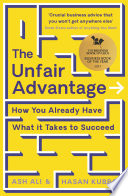

The first key idea of 'The Unfair Advantage' is the importance of recognizing and leveraging your unique strengths. The authors argue that every individual possesses a set of skills, experiences, and characteristics that can provide a competitive edge in entrepreneurship and business. This concept revolves around the idea that rather than trying to fit into a mold or emulate others, entrepreneurs should focus on what makes them unique. This can include personal experiences, skills developed over time, or even networks that provide access to resources. By identifying and harnessing these unique strengths, individuals can create opportunities that others may overlook, providing a distinct advantage in their ventures. The book encourages readers to engage in self-reflection and assessment to uncover these strengths, emphasizing that a deep understanding of oneself can lead to more authentic and successful business strategies.
Continue readingThe second key idea emphasizes the significance of networks and relationships in achieving success. The authors illustrate how connections can serve as an unfair advantage, providing access to resources, knowledge, and opportunities that are not available to everyone. They argue that building a strong network is essential for entrepreneurs, as it can lead to partnerships, mentorships, and collaborations that can propel a business forward. The book discusses various strategies for networking effectively, including the importance of reciprocity, authenticity, and maintaining relationships over time. By cultivating a robust network, entrepreneurs can tap into collective knowledge and resources, making it easier to navigate challenges and seize opportunities.
Continue readingThe third key idea revolves around the necessity of embracing failure as a crucial component of the entrepreneurial journey. The authors argue that many successful entrepreneurs have faced significant setbacks and failures, which ultimately contributed to their success. They emphasize that failure should not be viewed as a dead end but rather as a valuable learning opportunity. The book encourages readers to adopt a growth mindset, where failures are analyzed and understood, leading to improved strategies and resilience. By reframing failure as a stepping stone, entrepreneurs can foster innovation and creativity, ultimately leading to better outcomes in their ventures.
Continue readingThe fourth key idea focuses on the importance of understanding and leveraging market trends and timing. The authors argue that being attuned to shifts in consumer behavior, technology advancements, and industry changes can provide a significant advantage. They discuss the concept of 'timing' as a critical factor in the success of a business, highlighting examples of companies that thrived by entering the market at the right moment. The book encourages entrepreneurs to conduct thorough market research and remain adaptable to changes, allowing them to pivot their strategies as needed. By staying ahead of the curve, entrepreneurs can capitalize on emerging opportunities and position themselves as leaders in their respective fields.
Continue readingThe fifth key idea underscores the importance of resilience and persistence in the entrepreneurial journey. The authors highlight that entrepreneurship is often fraught with challenges and obstacles, and the ability to persevere through tough times is crucial for long-term success. They share stories of entrepreneurs who faced adversity and how their resilience contributed to their ultimate achievements. The book provides practical advice on building resilience, such as maintaining a positive outlook, seeking support from peers, and developing coping strategies. By fostering a resilient mindset, entrepreneurs can navigate the ups and downs of their ventures more effectively.
Continue readingThe sixth key idea revolves around the necessity of innovative thinking and creativity in entrepreneurship. The authors argue that in a rapidly changing business landscape, the ability to think outside the box and come up with unique solutions is a vital unfair advantage. They encourage readers to cultivate creativity by exploring diverse perspectives, engaging in brainstorming sessions, and embracing experimentation. The book emphasizes that innovation is not limited to product development but can also be applied to business models, marketing strategies, and customer engagement. By fostering a culture of creativity, entrepreneurs can differentiate themselves from competitors and drive growth.
Continue readingThe seventh key idea focuses on the importance of strategic decision-making and effective risk management. The authors discuss how successful entrepreneurs are often adept at making informed decisions that balance risk and reward. They emphasize the need for thorough analysis and consideration of potential outcomes when making business decisions. The book provides frameworks for evaluating risks and identifying opportunities, encouraging entrepreneurs to approach decision-making with a strategic mindset. By mastering the art of decision-making, entrepreneurs can navigate uncertainties and position their businesses for success.
Continue readingThe reading time for The Unfair Advantage depends on the reader's pace. However, this concise book summary covers the 7 key ideas from The Unfair Advantage, allowing you to quickly understand the main concepts, insights, and practical applications in around 24 min.
The Unfair Advantage is definitely worth reading. The book covers essential topics including Understanding Your Unique Strengths, The Role of Networks and Relationships, Embracing Failure as a Learning Tool, providing practical insights and actionable advice. Whether you read the full book or our concise summary, The Unfair Advantage delivers valuable knowledge that can help you improve your understanding and apply these concepts in your personal or professional life.
The Unfair Advantage was written by Ash Ali, Hasan Kubba.
If you enjoyed The Unfair Advantage by Ash Ali, Hasan Kubba and want to explore similar topics or deepen your understanding, we highly recommend these related book summaries:
These books cover related themes, complementary concepts, and will help you build upon the knowledge gained from The Unfair Advantage. Each of these summaries provides concise insights that can further enhance your understanding and practical application of the ideas presented in The Unfair Advantage.